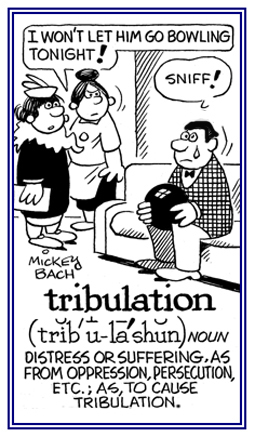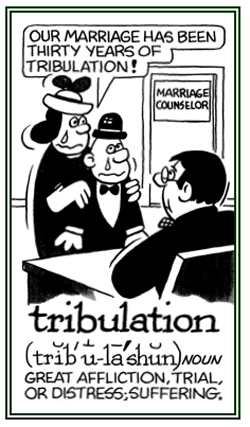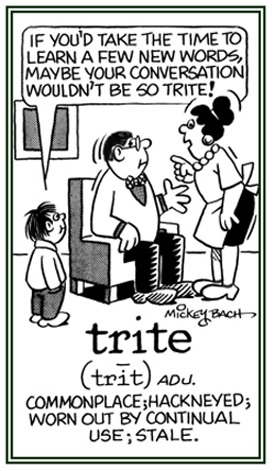trit-
(Latin: to rub; to thresh, to grind; to wear away; from tritus, past participle of terere, "to rub")
Don't confuse this trit- with another trit- which means "third".
2. An experience that tests one's endurance, patience, or religious faith: The illness of Donna's son has been a cause of great tribulation for her and her husband.
3. Etymology: from Old French tribulacion (12th century), from Late Latin tribulationem, tribulatio, "distress, trouble, affliction"; from tribulatus, tribulare, "to oppress, afflict"; a figurative use by Christian writers of Latin tribulare "to press"; also possibly, "to thresh out grain;" from tribulum "threshing sledge", from stem of terere, "to rub" + -bulum, a suffix forming names of tools.
Originally tribulation came from Greek; then through Latin, "to press; affliction"; and by extension, "distress, great trial", or "affliction".
The Roman tribulum was a sledge consisting of a wooden block studded with sharp pieces of flint or iron teeth. It was used to bring force and pressure against wheat in grinding out grain.
The machine suggested the way trouble grinds people down and oppresses them, tribulations becoming another word for troubles and afflictions. The word is first recorded in English in 1330.
The Romans ground out their corn (grain) with a heavy roller, mentioned in Vergil’s Georgics among agricultural instruments: the tribulum, a diminutive noun, from tritere, trit-, "to rub", from Greek tribein, "to rub".
"Being ground under and pressed out" made an excellent metaphor to express the trials and tribulations of the early Christians.


Go to this Word A Day Revisited Index
so you can see more of Mickey Bach's cartoons.
2. Worn out by abrading and extensive usage by vehicles: The local road was so frequently used by so many cars, trucks, etc. that it became the most trite way to travel in that area.

Go to this Word A Day Revisited Index
so you can see more of Mickey Bach's cartoons.
2. A reference to being well worn; worn out by rubbing; frayed: Helen observed that the rug in the hall was looking tritely and would need to be replaced soon.
2. A condition of having been ground or rubbed into a fine powder: The chef used a stone mortar and pestle to create a trituration of fine herbs for the new recipe.
3. A pharmacologic medicinal mixture of powdered drugs prepared pharmaceutically: The druggist, Mr. Johnson, prepared a trituration which she instructed the patient to apply to the wound on her leg three times every day.
4. The mixing of an amalgam, usually of silver and mercury, for use in filling cavities in teeth: Dr. Jackson, the dentist, promised the trituration which she had compounded would not hurt the enamel on the adjacent teeth.
Cross references of word families that are related directly, or indirectly, to: "rub, rubbing; wear away; wipe": bruxo, brux-; frica-, frict-; terg-; tribo-; -tripsy.

